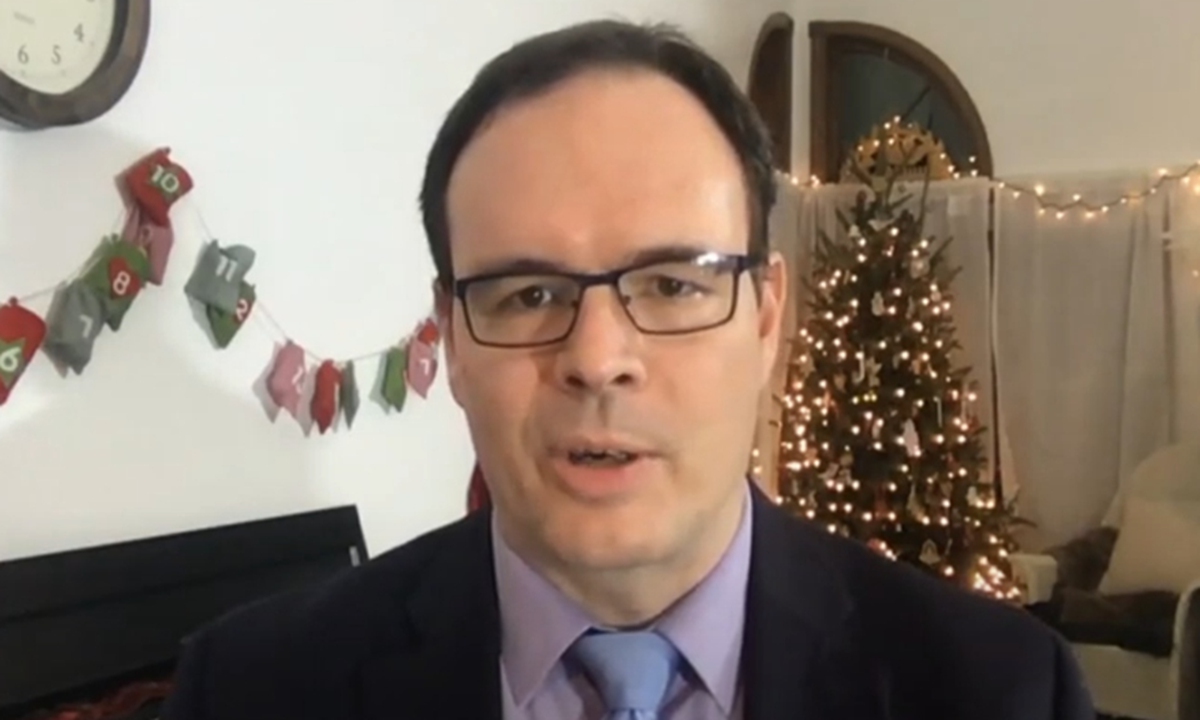
Adrian Zenz Photo: Screenshot of an online video
Recently, at the instigation of the US, some Western politicians, scholars and media have wantonly fueled rumors about Xinjiang Uygur Autonomous Region. What exactly do these people want?To smear China's image. The US and other Western countries are engaged in strategic competition with China, both in the material dimension of economy, science and technology, and the non-material dimension of systems and values. China excels in the first dimension; as for the second, even the West has to admit China's institutional advantages after the test of the COVID-19 pandemic, but will they give up so easily? Of course not, so it is only natural that they would borrow the nasty tricks that difficult students play on top ones out of a feeling of discontent. The West wants to prove that China's development, no matter how successful, is merely a totalitarian achievement, an accidental fluke and a flash in the pan, because the Chinese system does not work. Essentially, this does not only reflect the institutional hegemony in the West, but also the psychological victory after losing strategic confidence.
To divide and dismember China. This has been a major part of the US's long-standing strategy on China, and a very insidious and poisonous one. The American plot to dismember China started to simmer as early as the eve of the founding of the People's Republic of China in 1949. It is also with such ill intentions that the US instigated "the rule of China separately by the Communist Party of China and the Kuomintang along the Yangtze River," later offering long-term support for "Taiwan independence" forces and obstructing China's reunification. It offers support for the "Hong Kong independence" forces that try to sow trouble in Hong Kong and China at large today. The US has never stopped supporting and using the forces of "Tibet independence" and "Xinjiang independence." For many reasons, the US believes that wantonly fabricating and spreading rumors on Xinjiang issues would most conveniently stir up hatred among the ethnic groups in Xinjiang, other Chinese people and the Chinese government, intensify China's internal contradictions, and lead to civil unrest in China. As a result, the US will do everything to fabricate and spread such rumors.
To undermine the Chinese economy. The fact that China's economic growth stands out today is prone to arouse jealousy, which is particularly true for those who are hostile to China, who need excuses to create economic chaos and problems for China. For example, people in Xinjiang migrate to Southern China to work or pick cotton locally to earn money, which is all too common and could help people shake off poverty and become better-off. However, some people in the West describe it as "forced labor" and then in all seriousness, they announce sanctions against Xinjiang, China, and prohibit the import of cotton and other related products originating in Xinjiang. This clumsy and inept way shows that those anti-China and Sinophobic forces are totally blind when they rush to find a way to disrupt the development pace and undermine the growth momentum in China.
To hold back the Belt and Road Initiative. Featuring consultation, contribution, openness, sharing, mutual benefit and win-win outcomes, this initiative is an important public good provided by China to the international community, with the aim to create new development opportunities and impetus amid a sluggish global economy. Since Chinese President Xi Jinping proposed the initiative in 2013, it has been well received by the international community with warm support. By the end of last year, China had signed agreements on Belt and Road cooperation with 138 countries and a large number of development projects had been launched or completed, significantly boosting the economy and people's livelihood of various countries. In contrast, those self-proclaimed large and powerful countries that should have provided similar public goods for the international community, but didn't do so, regard the initiative as a thorn in the side and start to look for trouble. As an important hub of the Belt and Road Initiative, Xinjiang would naturally become their first choice.
Frankly speaking, although some Western politicians use political swindlers and religious extremists like Adrian Zenz to invent wild lies about Xinjiang and deceive people, justice and righteousness would not allow them to deceive the whole world forever. Maxime Vivas, a French writer, and The Grayzone, a website in the US, have revealed through facts Adrian Zenz's ugly collusion with former US secretary of state Mike Pompeo and others to smear and attack China. In the end, they have simply turned themselves into clowns in front of the whole world.
The author is Consul General of China in Rio de Janeiro. opinion@globaltimes.com.cn
